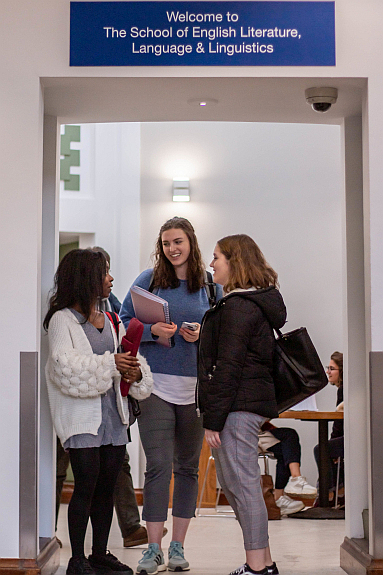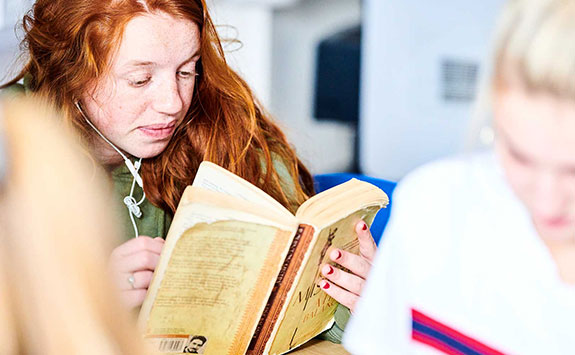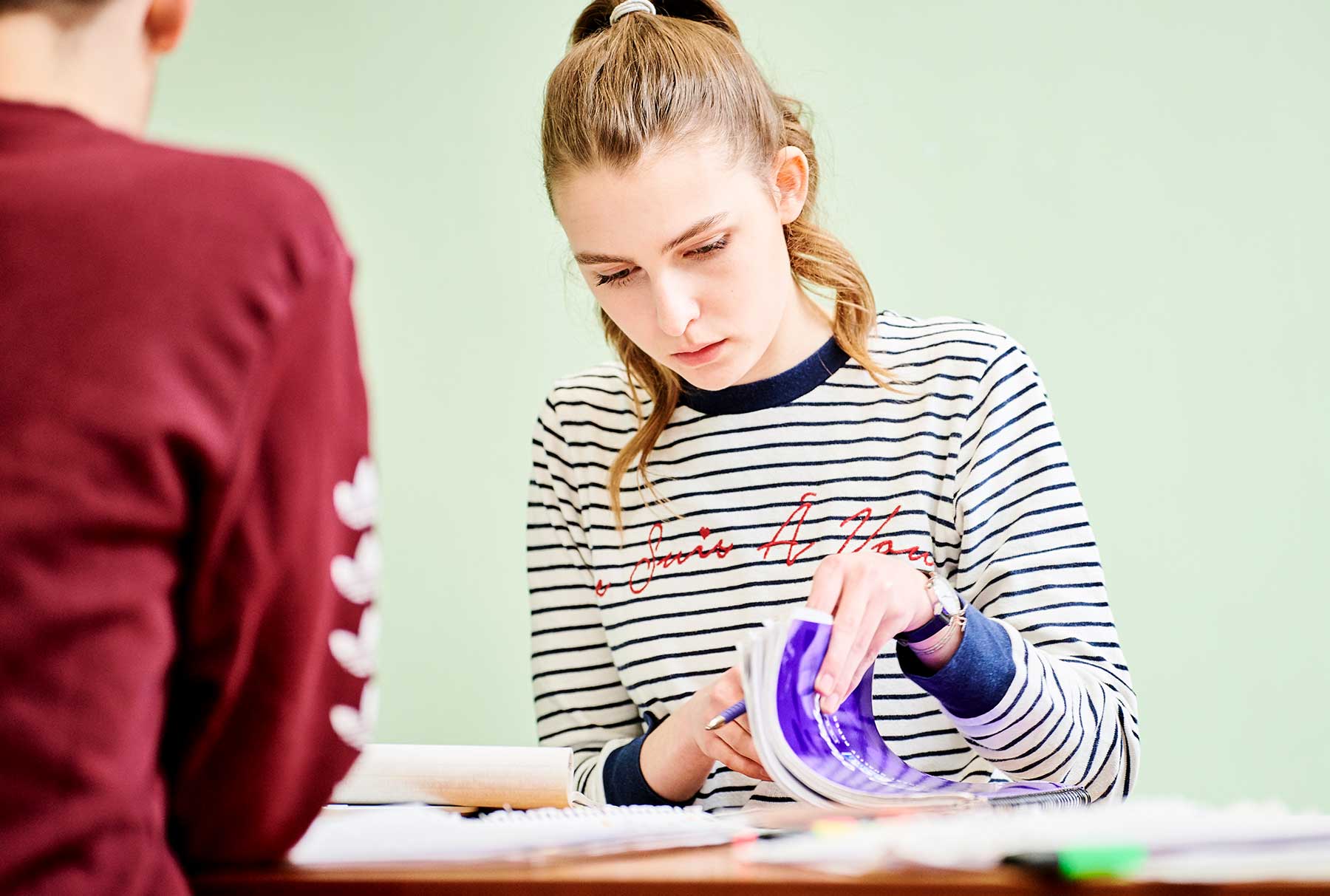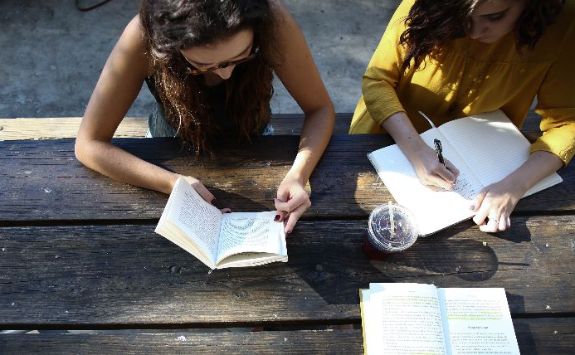QW38: English Literature with Creative Writing
We are excited to welcome you to our School
We are ranked first in the UK for Creative Writing (by The Times and Sunday Times Good University Guide 2024) and you will be learning from, and working with, some of the best creative artists we have.
Our creative writing team includes two winners of the T.S Eliot Prize, and winners of the Somerset Maugham Award, the Gordon Burn Prize, and nominees for BAFTA and Evening Standard Awards. All our creative artists are currently writing, filming and composing new work and their aim is to pass their skills, knowledge and networks onto you.
On this page you will find:
- Some tips for developing your craft as a creative writer;
- Information about what you can do on each year of your degree;
- What academic support is available to help you develop your writing and craft;
- What opportunities there are to hear from professional writers and to showcase your own work;
- Supports you may need if you have a health condition or caring responsibilities that might impact on your degree.
As creative artists, we hope you will enjoy this beautiful short film made by the BAFTA and Sundance-nominated Tina Gharavi. Tina teaches documentary film-making and scriptwriting on your degree and has shot her most recent film, Night and Day, in the North East.
Tina describes this film as a 'visual poem' and it is based on 'Two Lighthouses' by the North East poet, Julia Darling.
"Two Lighthouses"
I would like us to live like two lighthouses
at the mouth of a river, each with her own lamp.
We could see each other across the water,
which would be dangerous, and uncrossable.
I could watch your shape, your warm shadow,
moving in the upper rooms. We would have jokes.
Jokes that were only ours, signs and secrets,
flares on birthdays, a rocket at Christmas.
Clouds would be cities, we would look for omens,
and learn the impossible language of birds.
We would meet, of course, in cinemas, cafes,
but then, we would return to our towers,
knowing the other was the light on the water,
a beam of alignment. It would never be broken.
Julia Darling
from Apology for Absence (2005)

Writing Creatively
Margaret Atwood has written that: These are the three questions most often posed to writers, both by readers and by themselves. Who are you writing for? Why do you do it? Where does it come from?
(Atwood, Negotiating with the Dead: A Writer on Writing (Cambridge: Cambridge UP, 2002), p. xix)
These are important questions you will often ask yourself as you explore, develop and hone your craft. It helps a lot to read other writers and there are some tips on what to read in our English Literature section.
You will develop your own answers to all of these questions but our best advice to help you with "where does it come from?" is to keep a notebook.
As you read and think and remember, write down the ideas, images, metaphors, and turns of phrases that come to your mind. Don’t put pressure on yourself to polish these – just write down any thought or turn of phrase that strikes you as interesting, evocative, or having energy.
Keeping a notebook like this – a wordhoard – will give you a rich source of prompts for your own writing.

What kinds of modules do I take in first year and beyond?
When you study Creative Writing here, you learn from working playwrights, film-makers, novelists and poets. This means there is a strong focus on working with you as an individual to shape and craft your ideas. You may choose to do one third or half of your degree in creative writing and you choose when you arrive.
In your first year, you have two core creative writing modules – Introduction to Creative Writing which introduces you to writing prose and poetry, and Drama, Theatre and Performance which introduces you to playwriting. if you are doing half your degree in creative writing, you will take a third module which builds on what you have learned in Introduction to Creative Writing.
In second year, your Creative Practice module teaches you the craft of writing across a range of modes. In the second half of the year you have a choice between four specialist workshops in prose, poetry, playwriting or screenwriting. You select either one or two of these workshops depending on whether you have chosen to do half or one-third of your degree in creative writing. This gives you specialist skills in your preferred modes and genres and each workshhop is taught by a practising and published poet, playwright, filmmaker or novelist.
In third year, you will develop your final creative pieces for your portfolio. You work one-to-one with your supervisor to shape and develop your work, whether it is a collection of poems, part of a novel, a play or a film script. If you are interested in filmmaking this is the year in which you usually can take a documentary film-making module and learn the art of making and editing a short film.
Tip: When choosing your Literature modules, you should look out for modules that offer a creative piece as an assessment option, such as first year's Transformations or third year's Envious Show. Transformations studies the art of adaptation, and invites you to compose your own adaptation of, or response to, a major canonical work. Envious Show, which studies the literature and film of the country house, allows you to compose a creative piece in response to a text, a character, or inspired by an idea you have encountered on that module.

Academic Support for Students
If you need extra support to ensure you can fulfil your potential at university, we have services and people you can draw on throughout your degree here.
All students can avail of two Fellows of the Royal Literary Fund who are professional writers based in the School of English. The RLF fellows are advisors dedicated to developing your writing. You can email them and have one-to-one appointments where you can develop and refine your writing style and argumentation. Students (and staff) have found their guidance extremely helpful in shaping their writing. You will also receive dedicated academic support from personal tutors and library staff in addition to the advice, guidance and support of your lecturers and seminar leaders.
The Library also offers a huge range of resources you can explore at your own pace, drop-in sessions, and advice on how best to use all the academic resources available to you.

Who will I work with? What could I achieve?
- Hear work from undergraduates at the launch of our annual anthology of the best creative writing from our graduating year.
- Watch the trailer for Tina Gharavi’s Queen Cleopatra (Netflix) or read about her latest film, Night and Day, with Jack Whitehall and Haley Bennett.
- Read an interview with Zoe Cooper, currently seconded to the Royal Shakespeare Company, about her latest play A Song for Ella Grey.
- Hear our Professor of Creative Writing, Lars Iyer, read from his latest novel My Weil and read this Washington Post interview.
- Listen to our Professors of Poetry, Sinead Morrissey and Jake Polley reading their work.
- Join the Creative Writing Society (CreSoc) and meet creative writers from across the university. They run regular writing sessions and social events.
.jpg)
We know that some students experience extra challenges when undertaking their degree
If you have a medical condition or are diagnosed with one during your degree, have caring responsibilities for adults or children, or experience financial or other challenges, a degree can be harder to undertake. Here we have information and advice on how to access the academic and pastoral support you need.
We have our own dedicated support for our students. Our colleague, Kirsty Robson, is a trained social worker and now works to guide and advise our students.
‘My name is Kirsty, and I am the dedicated Student Wellbeing Advisor for SELLL students. My role as the Student Wellbeing Advisor is to act as a point of contact within the School, to support students in accessing appropriate support and resources to improve and maintain their personal wellbeing. This can be in relation to a wide range of circumstances and difficulties.
I offer confidential, one-to-one appointments, a listening ear, advice and support. I can make referrals to more specialised teams within the University, such as Counselling, Finance, and Disability Support.'
Kirsty is part of the University's wider Student Health and Wellbeing Services team who offer a wide range of specialised support to students regarding their personal wellbeing. Students can refer themselves directly to that team or Kirsty can support you to connect with them.
You will also be assigned a Personal Tutor at the beginning of the academic year whom you will meet in induction week. Your Personal Tutor is the first port-of-call for any academic or pastoral issues. We also have a First Year Senior Tutor whose role it is to support you in your transition from secondary school to university. You will also get a Peer Mentor in your first week of university who will be a second or third-year student who can offer advice from a student perspective.
I offer confidential, one-to-one appointments, a listening ear, advice and support.
Adjustments to help you learn and to complete assessments
Student Support Plans (SSPs) outline adjustments you may need for your studies or assessments because of particular physical or mental health issues with which you have been diagnosed.
With your consent, these plans are shared with the academics teaching you so they are aware of your needs.
If you have a pre-existing condition and if you have included that information on your UCAS form, Wellbeing Services will receive that information and be in touch with you once you join us. If it was not included, you can email disabilityadvisor@ncl.ac.uk to request an appointment at any time in the run up to the September you are hoping to commence study with us.
If you have had an issue recently diagnosed or it is diagnosed after you arrive, you can always set up a support plan or revise an existing one. To do this all you need to do is one of the following:
- contact our dedicated Student Wellbeing Advisor, Kirsty Robson;
- contact your Personal Tutor;
- contact the First Year Senior Tutor;
- email disabilityadvisor@ncl.ac.uk directly yourself to make an appointment
Caring and the Cost-of-Living
We have a scheme called 'Carers' Passports' to support students with caring responsibilities. This gives students who are carers the flexibility they need to do their degree and support those for whom they care.
We are very much aware of the cost-of-living crisis and the impact it has on students. Please do not hesitate to get in touch if you are experiencing financial struggles at any point during your degree. You can also get in touch if you simply want some advice on budgeting or managing money. We are here to help you.
Please note
Our teaching is informed by research. Course content may change periodically to reflect developments in the discipline, the requirements of external bodies and partners, and student feedback. Please rest assured we make all reasonable efforts to provide you with the programmes, services and facilities described. However, it may be necessary to make changes due to significant disruption, for example in response to Covid-19.
Full details of the modules on offer will be published through the Programme Regulations and Specifications ahead of each academic year. This usually happens in May.
To find out more please see our terms and conditions..

